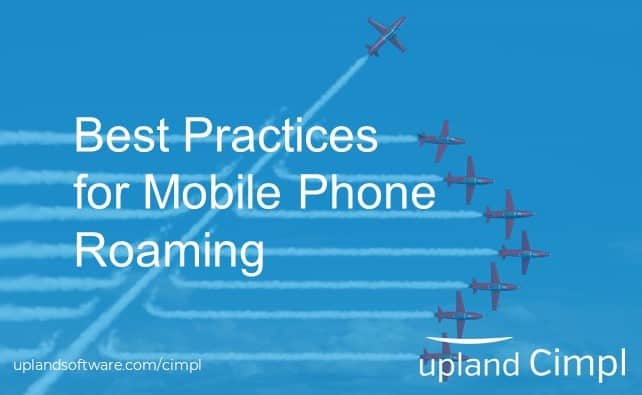Best Practices for Mobile Phone Roaming
Every month, enterprises face invoices for every employee who holds a corporate liable mobile phone. Most businesses would agree, when it comes to travelling employees, that monthly invoice can get a lot scarier. Mobile roaming charges can quickly get out of hand, and often without employees even realizing just how far they’ve gone with their data. Mobile expenses can be a major hurdle for companies trying to maintain control over their costs.

Just this year, the European Union (EU) finally went through with plans to end roaming charges entirely. Now, when travelling in Europe, telecommunications providers won’t be able to tack on roaming charges so long as you’re roaming from Europe. Employees travelling abroad will no longer have to be constantly checking their data usage, and employers won’t have to stress out over the potential consequences when their employee returns from a conference. The EU’s decision will be a major leap for travelers in Europe, who previously kept their smartphones off at all times, and who will now be using data freely as if using it from home.
While this change may be comforting, and may suggest that similar changes could eventually span across the globe, Americans aren’t likely to have their roaming charges waived any time soon. Enterprises can now send their employees to Europe with little to no fear of how much data usage they’re incurring, but what about everywhere else in the world? With sales people travelling from coast to coast on a regular basis, the monitoring and reduction of roaming remains a challenge to be reined in.
In fact, mobile roaming fears have spread like wildfire, and have even lead to the Canadian Radio-Television and Telecommunications Commission (CRTC) to review the Canadian Wireless Code of Conduct, a code set out to protect consumers from unruly overages and fees. The updated code addresses issues such as bill shock, phone unlocking fees, and even cancellation fees, all areas where consumers are at risk of paying excessive charges. According to the updated code, extra data charges and roaming fees should be capped at a certain amount to avoid extreme bill shock. Only account holders, by default, can consent to overages and data roaming charges above your chosen limits. If desired, pre-defined limits can be set and will be respected unless the user requests an extension on their data. These changes should help enterprises rest a little easier when sending their employees abroad.
Despite recent events to help reduce the impact of roaming charges on consumers and businesses alike, preventative measures are still in order. To combat unexpected mobile phone roaming charges in your enterprise, here are some tips for keeping roaming costs low.
Wi-Fi
From time to time, it’s good to remind employees to take advantage of available wireless networks whenever possible. Whether your employee is stopping at a coffee shop to take a break and check e-mails, or they’re settling in for a video conference on their mobile device, connecting to Wi-Fi can make a significant difference. It’s as easy as working from a hotel room or a café where Wi-Fi is easily accessible, and it will go a long way for keeping roaming charges low.
Enable Data Alerts
Make sure that employees are well-equipped with data alerts. Sometimes, between video calls and sifting through all those e-mails, employees don’t realize how much data they’ve consumed until it’s too late. By enabling data alerts, employees will receive an alert notifying them that they are approaching their limit, and will soon be incurring extra fees. This can be an easy way to remind employees to slow down on data use.
Encourage Minimalism
Different activities will require more data usage. Things like video calls and streaming will eat away at your data faster than anything else. Encouraging employees to avoid these tasks unless absolutely necessary will go a long way in bringing you cost savings. It can be as easy as deciding to take a regular phone call instead of a video call, or waiting until you’re connected to Wi-Fi to stream videos and audio. Small steps like these can add up over time, especially for companies with hundreds and thousands of employees using data on a daily basis.
Explore Plans and Options
One of the best ways to avoid unexpected bill shock is to prevent it from happening in the first place. By taking the time to really analyze the available plans for your company, in comparison to the needs of employees, you can seek out rates that meet your standards. If your invoices are always soaring above the data limit that’s been put in place, perhaps it’s time to switch to a plan with more data. Optimizing your services by choosing the plans that properly serve your business needs will benefit you long-term, and instead of paying hefty fees for surpassing your limit, you’ll be paying just a little extra every month for all of the data you need.
Outsource the Stress
When all of your telecom bills are getting the best of you, it might be time to consider outsourcing the problems to professionals who know how to help. Managing your telecom expenses can be a major challenge, especially when it comes to mobile devices. You may want to consider a technology expense management solution such as Cimpl. Not only will you have your entire expense management processes outsourced and taken care of through an accessible and flexible platform, but you’ll also be able to regain control over your technology and telecom environment.
Professionals at Cimpl are dedicated to not only managing your IT and telecom inventory, but also to optimizing your costs and to saving you time. After meeting with your provider and negotiating new contracts and rate plans, Cimpl will bring you better long-term results, without the stress of unexpected bills and overages. Plans will be selected based on your unique needs, in order to make sure you are spending no more than you have to. Along with preventive measures, any disputes such as billing discrepancies will be managed by us, and credits will be recovered accordingly.
If you’d like to learn more about IT, telecom, and cloud expense management, and how Cimpl can help you implement best practices for mobile phone roaming, contact us today. You can also take a look at our latest ePaper, Cimpl Product Evolution: A Recap of 2017. You’ll learn all about the changes and product releases that Cimpl has implemented in the past year, and how we’ve served our customers’ needs.

More resources

Make Your Data Work for You with Intelligent Capture for InterFAX
By automating decisions on document classifications, data, and user assignments, Intelligent Capture for InterFAX has the tools necessary to fit even the most obscure business processes.

Can you really future-proof CX? Probe CX says yes!
Knowledge management. It used to be something organizations were slightly aware of, but not well versed in what it could do for them. However, all of that is changing in the last few years as the AI hype has ramped up. To learn more about how organizations are utilizing AI with their knowledge, we spoke […]

How KCS Knowledge Workers Can Make AI Work for Them
There has been a lot of discussion within the KCS community regarding how best to utilize AI when it comes to knowledge management. And many KCS practitioners are eagerly awaiting what the KCS v7 standard will have to say about AI. In the meantime, many companies (Upland Software included!) are doing their best to use AI in a responsible, sustainable manner that will help knowledge workers and minimize many of the risks that are inherent with AI.